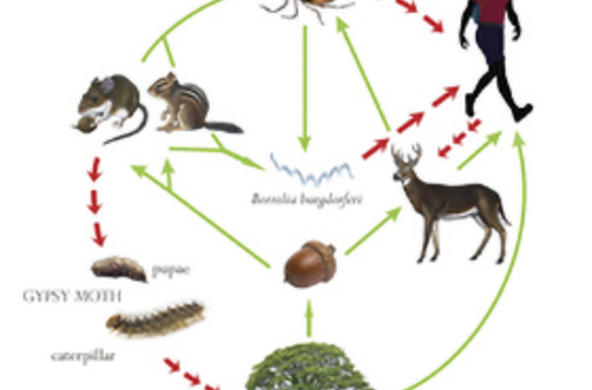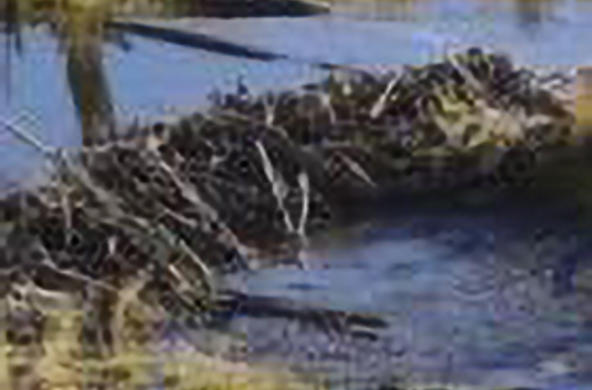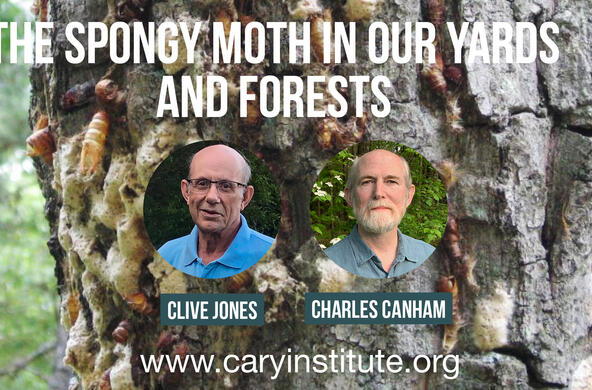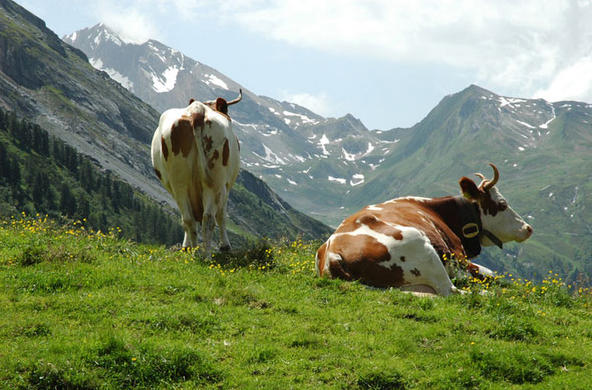- Profile
- Videos & Podcasts
- Past Projects
- Publications
- CV
Clive Jones has spent much of his career studying how organisms physically modify the non-living environment and the consequences for those species, other species, and ecological processes. This now well-established field of basic and applied science pioneered by Jones is called ecosystem engineering. Dam-building beavers, earthworms plowing soil, plants stabilizing sand dunes, and soil crusts made by microbes are a few of many examples of species engineering the environment.
Humans are ecosystem engineers par excellence – agriculture is just one example. Jones explores how knowledge of nature’s ecosystem engineers can be used to help understand human environmental modification with the goal of reducing adverse collateral impacts, such as allowing rivers to meander to enhance flood control, rather than straightening them. Of particular interest to Jones is the growing use of nature’s engineers to do the work of environmental modification. Examples include reintroducing beaver to regulate hydrology and create habitats for species; using coral reefs, oyster reefs, mangroves, and salt grass to increase coastal protection and improve water quality; and reintroducing native earthworms in agriculture to enhance soil drainage, aeration, and soil fertility.
The application of our basic understanding of nature’s ecosystem engineers illustrates dual strategies of using natural processes and mimicking nature to enhance environmental sustainability. Helping develop ecosystem engineering into a practical arm of sustainability science has also been an emphasis of Jones’ efforts. This has included helping build multidisciplinary networks of scientists, practitioners and decision makers oriented around application of ecosystem engineering, and incorporating ecosystem engineering into the training of environmental engineers and managers.
Jones has also contributed to understanding complex interaction webs in oak forests that connect oaks and acorns with insect outbreaks and Lyme disease. His earlier work in chemical ecology involved the development of theories on evolution of the diversity of chemical defenses, and empirical work on interactions among plants, herbivores, microbes, and environmental stress. He has also contributed to ecological synthesis, integration and theory.
-

The Acorn Connections
Acorns are a key food for white-footed mice. The mice are key predators on Spongy Moth pupae. When there are many acorns the mouse population increases, which keeps the moth population low
-

Ecological Engineering
Primary interests in this area are focused on the utilization of ecosystem engineering species; applying lessons learnt from the study of Nature's engineers to human environmental engineering; and the promotion and development of the discipline and practice of ecological engineering.
-

Organisms as Ecosystem Engineers
Dr. Clive G. Jones
Ecologist, Emeritus Senior Scientist
Cary Institute of Ecosystem Studies
Tozer Ecosystem Science Building
2801 Sharon Turnpike (Route 44). P.O. Box AB
Millbrook, N.Y.
Telephone: (845) 677-5343
E-mail: jonesc@caryinstitute.org
Website: https://www.caryinstitute.org/science/our-scientists/dr-clive-g-jones
Google Scholar Profile: https://scholar.google.com/citations?user=2xgMtQcAAAAJ&hl=en&oi=ao
Profile (pdf)
Education
D. Phil. Biology, University of York, UK, 1978
B.Sc. (Honors Class1) Biology, University of Salford, UK, 1974
Professional Positions
Emeritus Senior Scientist, Cary Institute of Ecosystem Studies, 2016 - Present
Senior Scientist, Cary Institute of Ecosystem Studies, 2008 - 2016
Senior Scientist, Institute of Ecosystem Studies, 2004 - 2008
Scientist, Institute of Ecosystem Studies, 1993 - 2004
Associate Scientist, Institute of Ecosystem Studies, 1987 - 1992
Assistant Scientist, Institute of Ecosystem Studies, 1983 - 1986
Chemical Ecologist, Cary Arboretum, 1980 - 1983
Postdoctoral Fellow, University of Georgia, 1978 - 1980
Selected Professional Honors
Royal Netherlands Academy for Arts and Sciences Visiting Professor
Invited Professor, AgroParisTech, Paris, France
Chaire Internationale de Recherche Blaise Pascal
John Simon Guggenheim Memorial Fellow
Elected Fellow, American Association for the Advancement of Science
Winston Churchill Traveling Fellow
British Ecological Society Traveling Fellow
Research Interests
- Ecosystem Engineering – Effects of physical environmental modification by organisms on organismal, population, community, ecosystem and landscape processes
- Ecological Engineering – Utilization of ecological processes for sustainable environmental management
- Ecological Synthesis, Integration and Theory
- The Acorn Connections – Complex interaction webs in oak forests connecting population, community and ecosystem dynamics
- Chemical Ecology – Plant/Herbivore/Microbial/Environment Interactions; evolution of secondary metabolism
Selected Publications (from over 200 including 6 books)
- Mathews, B., De Meester, L., Jones, C. G., Ibelings, B. W., Bouma, T. J., Nuutinen, V., van de Koppel, J. and Odling-Smee, J. 2014. Under niche construction: An operational bridge between ecology, evolution, and ecosystem science. Ecological Monographs 84: 245-263. DOI: 10.1890/13-0953.1.
- Jones, C. G. 2012. Ecosystem engineers and geomorphological signatures in landscapes. Geomorphology 157158: 75-87. DOI:10.1016/j.geomorph.2011.04.039.
- Jones, C. G., J. L. Gutiérrez, J. E. Byers, J. A. Crooks, J. G. Lambrinos, and T. S. Talley. 2010. A framework for understanding physical ecosystem engineering by organisms. Oikos 119:1862-1869.
- Hastings, A., Byers, J. E., Crooks, J. A., Cuddington, K., Jones, C. G., Lambrinos, J. G., Talley, T. S and Wilson, W. G. 2007. Ecosystem engineering in space and time. Ecology Letters 10: 153-164.
- Pickett, S. T. A., J. Kolasa, and C. G. Jones. 2007. Ecological Understanding: The Nature of Theory and The Theory of Nature. Second Edition. Academic Press, Inc., San Diego, California. 233 pp.
- Byers, J. E., Cuddington, K., Jones, C. G., Talley, T. S, Hastings, A., Lambrinos, J. G., Crooks, J. A. and Wilson, W. G. 2006. Using ecosystem engineers to restore ecological systems. Trends in Ecology and Evolution 21(9): 493-500.
- Gutiérrez, J. L., Jones, C. G., Strayer, D. L. and Iribarne, O. O. 2003. Molluscs as ecosystem engineers: The role of shell production in aquatic habitats. Oikos 101: 79-90.
- Wright, J. P., Jones, C. G. and Flecker, A. S. 2002. An ecosystem engineer, the beaver, increases species richness at the landscape scale. Oecologia 132(1): 96-101.
- Jones, C. G., R. S. Ostfeld, M. P. Richard, E. M. Schauber, and J. O. Wolff. 1998. Chain reactions linking acorns to gypsy moth outbreaks and Lyme disease risk. Science 279:1023-1026.
- Jones, C. G., J. H. Lawton, and M. Shachak. 1997. Positive and negative effects of organisms as physical ecosystem engineers. Ecology 78:1946-1957.
- Jones, C. G., and J. H. Lawton (eds.). 1995. Linking Species and Ecosystems. Chapman & Hall, Inc., New York. 387 pp.
- Jones, C. G., J. H. Lawton, and M. Shachak. 1994. Organisms as ecosystem engineers. Oikos 69:373-386.
- Jones, C. G. and Firn, R. D. 1991. On the evolution of plant secondary chemical diversity. Phil. Trans. Royal Society (London) B. 333: 273-280.
Clive Jones is recognized as the founder of the basic and applied research field of ecosystem engineering. He was a founder of the Ecological Engineering Applications Group in France; a founding editorial board member of the journal SAPIENS (Surveys and Perspectives Integrating Environment and Society); an editorial board member and Associate Editor for Functional Ecology; and a special issues editor for BioScience and Ecological Engineering. He was an international expert for the Institut Veolia and has served on numerous international advisory boards and panels. He is a contributing consultant on ecosystem engineering for Guinness World Records; and a member of the Board of Directors of This is My Earth.org.




